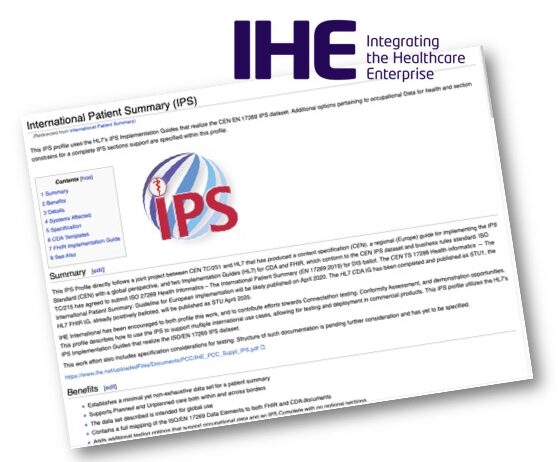
The IPS Profile ![]() is the latest in a series of artifacts developed by a collaboration of standards development organizations (SDOs) to support the global adoption of the International Patient Summary (IPS), considered an essential ingredient in managing quality care across any jurisdictional borders.
is the latest in a series of artifacts developed by a collaboration of standards development organizations (SDOs) to support the global adoption of the International Patient Summary (IPS), considered an essential ingredient in managing quality care across any jurisdictional borders.
Interoperability in digital health prescribes that relevant information concerning a patient must be available securely to those who need it, when they need it, and wherever they need it. With an increasingly mobile population, information needs to cross jurisdictional borders (local, regional, or national) as well as across a myriad of health systems. Consider a physician in Europe treating an Australian traveler with an unexpected and emergent medical need, or an Olympic athlete who sustains an injury while competing at an event far from home.
Leading clinical practice demonstrates that an initial overview of relevant clinical information about a presenting patient improves outcomes, while dramatically reducing time-to-treatment and cost. For decades, clinicians have relied on the patient summary to capture demographics, allergies, medical conditions, diagnoses, and essential diagnostic and treatment data. That data was taken at a point in time (such as discharge from a hospital, or when referring a patient to a specialist), but these documents (on paper or in a computer) were not standardized beyond local use. With the IPS profile, clinical data and messaging technology is standardized on a global basis, thereby facilitating the movement of this clinical information anywhere it is needed.
IHE has added a significant value to the IPS ecosystem by contributing a profile that remains consistent and supportive to artifacts developed by other SDOs. It also strengthens conformance and testing attributes, as well as extends the IPS global reach through IHE’s strong international presence. Even prior to publication, the IPS profile has already received a great deal of attention from countries and regions around the world. As an example, another IHE profile under development in collaboration with the World Health Organization (WHO) to support Computable Care Guidelines (CCGs) has adopted the IPS profile as its basic underpinning, highlighted in a short video How to leverage the IPS to improve global health.
